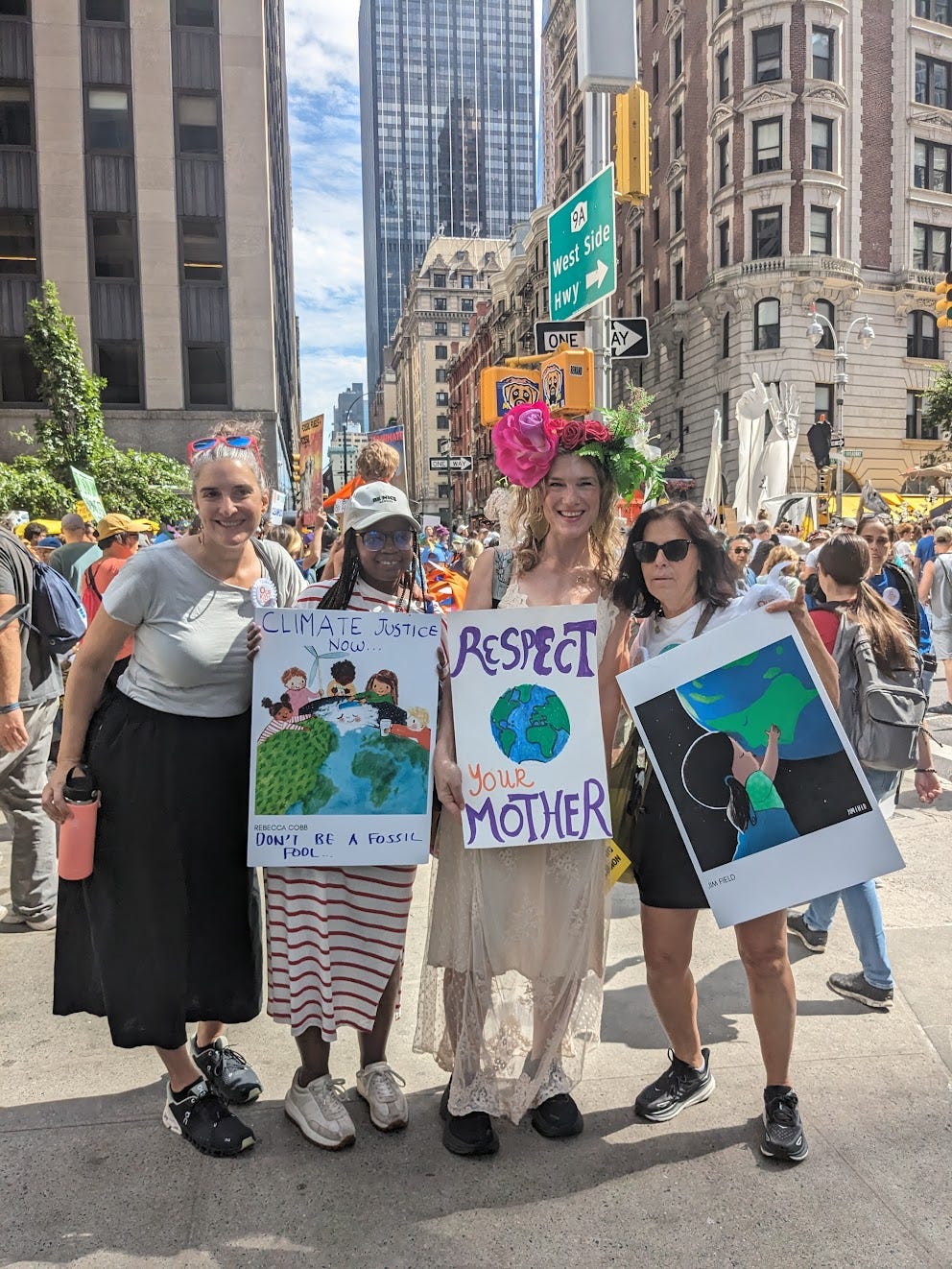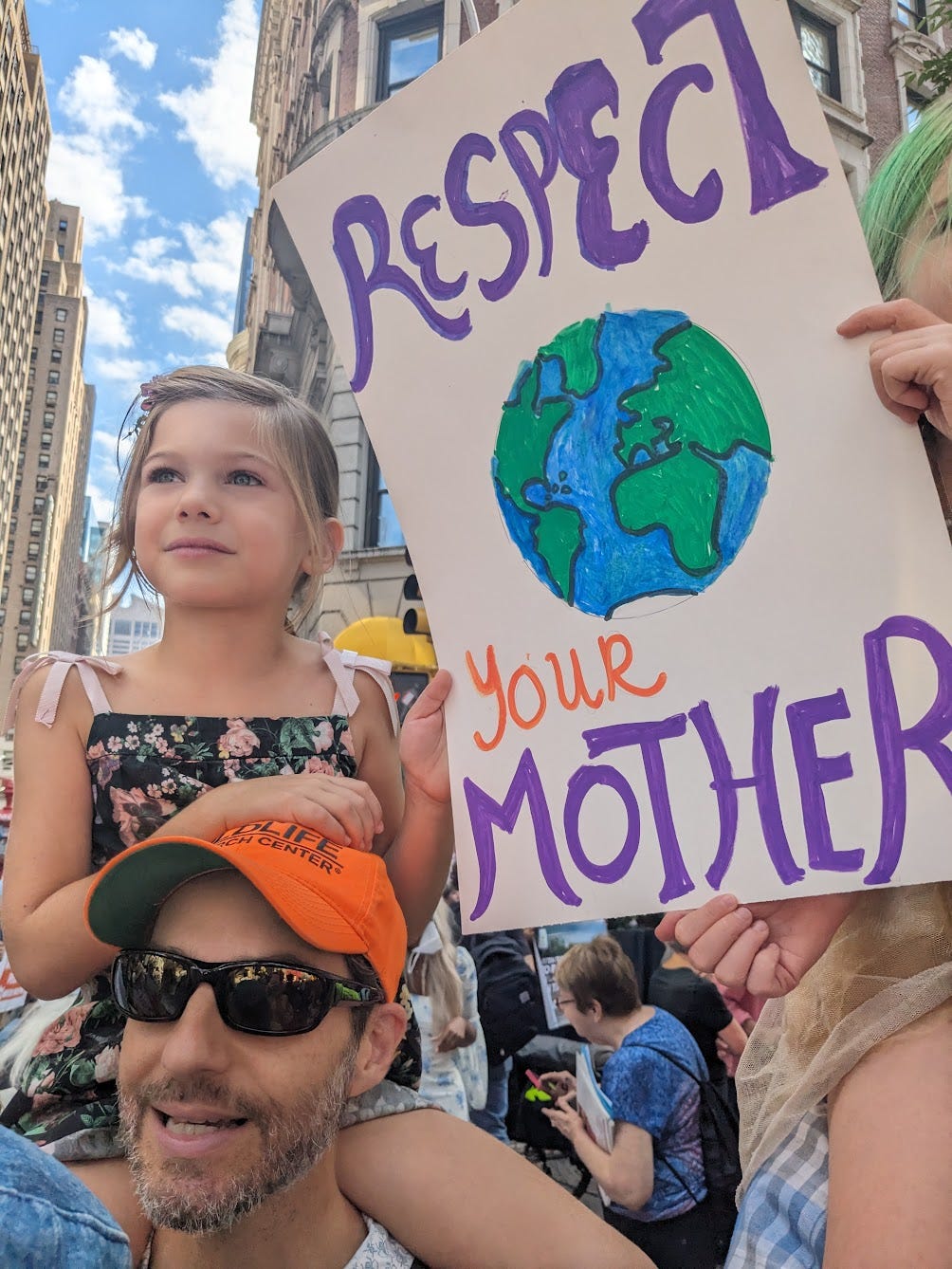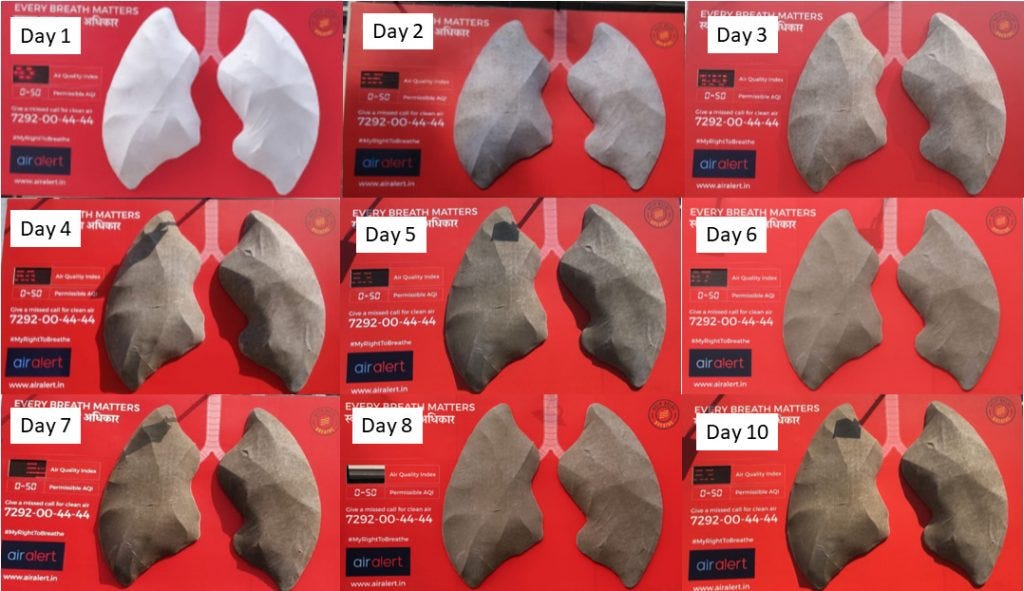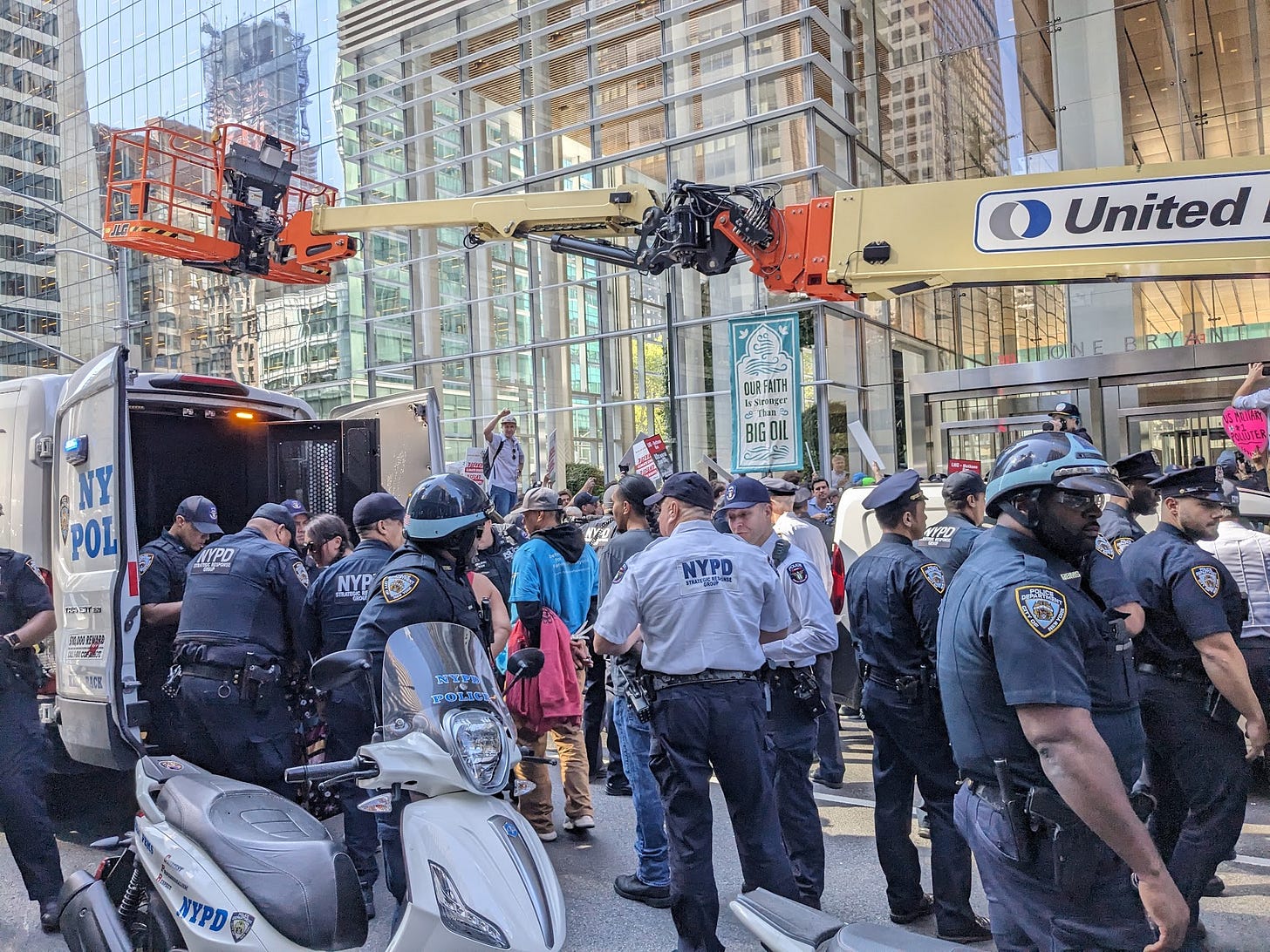(Not) Getting Arrested Outside Bank of America
And other Climate Week adventures with fierce mothers from around the world

Hello. Hello. It’s Climate Week in New York City. And the UN General Assembly. And the Clinton Global Initiative. Basically, a lot of people standing at podiums or sitting on panels talking about VERY IMPORTANT THINGS, and then standing around at receptions, happy hours and mixers talking at each other and nodding about VERY IMPORTANT THINGS, and taking each other to lunch and coffee and breakfast and maybe giving each other money to work on the VERY IMPORTANT THINGS. And then some of those same people, and some others, marching in the streets and yelling about, you guessed it, the very same VERY IMPORTANT THINGS.
On Sunday I was at the March to End Fossil Fuels with my whole family, and our neighbors, which was really sweet.
Tuesday I went to a protest in Midtown in front of the offices of Bank of America, which is a top funder of fossil fuel projects, to the tune of $279 billion just since the Paris Agreement. I was there to talk with three moms engaged in climate activism on three continents. The three of them are all connected with the group Our Kids’ Climate, which uplifts and supports parent climate organizers around the world.

Meet The Moms
Bhavreen Kandhari
Organization: Warrior Moms
Location: Delhi, India
Kids: Twin girls turning 20
How we got started: “2020 during COVID. I had been working in clean air for a while. We saw the lovely blue skies [from lockdown] and the journalists and media were calling me and saying, congratulations, ‘Bhavreen, your dreams are coming true!’ We have proven a point that the emissions are responsible for the air pollution. Now what do you do?”
The power of parents: “We know that every mom loves their children. So how can you let this toxicity come? Air pollution is the enemy and you have to protect your child.”
Symbolic protest: “We got doctors to install an installation of a lung to show the impact of air pollution. It got black in one day.”
Xoli Fuyani
Organization: Black Girls Rising
From: Cape Town, South Africa
Kids: 12 and 13
How we got started: “I grew up in a very vulnerable community really impacted by climate change. I went to school outside it, in a place with a lot of green spaces. And I decided, instead of just complaining, why not raise awareness and try to hold our city mayor accountable for greening our community?”
Local impacts: “The big impacts are water scarcity—there are a lot of informal settlements that lack infrastructure. In the city of Cape Town, young girls have to walk 2km to have access to clean water from a communal tap and six toilets for 55 families to share. And that causes a lot of risk not just environmentally but also socially—being raped and abducted along the way… It’s also period poverty, food security, the right to clean air.”
The power of parents: “I’m always concerned about the future of my own kids. I wanted to take action not just for me but for their future. And luckily I got connected to Our Kids’ Climate where there are other incredible parents who are not just sitting and watching things fall apart…I see the kids marching and I don’t think it’s fair for them. I just want to give them that freedom to be kids and to show them that there are adults who care.”
Maya Mailer
Organization: Mothers Rise Up
From: London, UK
Kids: 12, 10 and 5
How she got started: “It was the youth strikes in 2019. Seeing the youth out on the street and thinking, this isn’t their fight. As parents and as mothers, we would do anything to protect our kids, so now we need to step up. Our kids shouldn’t have to fix a problem that they didn’t create.”
Talking to her kids: “I take them to loads of protests. It’s a fact of life. At the same time, they don’t seem to have much eco-anxiety because they’re like, Mom’s got this. I don’t push them. They’re all more into football, including my daughter, which I think is great.”
The power of parents: “We use the concept of fierce love, to inspire parents to go after the fossil fuel enablers, like the insurance industry. And we wanted to bring a lot of joy and creativity into it to make it welcoming for people. Like a giant Mary Poppins flash mob.”
Within minutes after we walked up to Bank of America on Tuesday, several of the peaceful protesters were swiftly arrested and marched into paddy wagons, simply for standing in the wrong place on the sidewalk. Xoli and Bhavreen were pretty shocked by this. “They’re not doing anything wrong!” Bhavreen said as we stood next to a hotdog cart, outside of the danger zone. “Is this common in New York City?”
It was pretty embarassing considering America’s reputation as the, I don’t know, birthplace of the First Amendment? Violence, intimidation and harassment have become real dangers for activists, particularly environmental activists (almost 200 of whom were killed every year for the past 10 years). In the US, climate protest is increasingly criminalized—as in the use of federal racketeering (RICO) charges against Stop Cop City movement activists in Atlanta.
Honestly, that’s all the more reason you should show up sometimes to protests and marches and actions as part of your own climate work and transformation. Stick with the peaceful ones and bring the kids if you can. It’s really moving to be in community in person with so many people making their voices heard and working hard to make a difference. Climate Families NYC brought 400 people out on Sunday, many of whom had homemade dinosaur costumes (because we’re getting rid of fossil fuels, get it?)
Bonus: Gregory Corbino of the Stop Shopping Choir, made these captivating sea creature puppets from trash he collected in the New York Harbor. At the Climate March, we couldn’t stop looking at them.
Remembering Maya’s words: “There’s no one way to be a climate activist. Something is better than nothing.”
Some links
How to talk to kids about climate change — My interview on Slate’s parenting podcast, Mom and Dad are Fighting.
I Asked 65 Teens How They Feel About Being Online—I loved working on this piece and actually listening to young people . Their stories were nuanced and surprising.
Latest resource from Climate Mental Health Network: a background script with important facts and ideas when talking to middle and high school students about climate change and climate emotions.
I admire the work that Christina Kwauk and her team at Unbounded Associates are putting out, thinking deeply about the intersection of climate change, learning and youth well-being, with journalistic case studies. You can read their reports on higher ed here, early childhood here. I’ll be moderating a panel with “green learning for a just transition” leaders from Hawaii, Chicago and Kentucky next week, Wednesday September 27 at 3pm ET. Register!
Peer countries are leaving us in the dust when it comes to education for sustainable development. That's according to a new study from from the Smithsonian Science Education Center and Gallup.
The Climate Emotions Wheel is currently (through Friday 9/22 at midnight) being featured on a little kiosk in Times Square, courtesy of a company that sets up bottle-refilling stations. If you’re passing by, snag me a pic!








